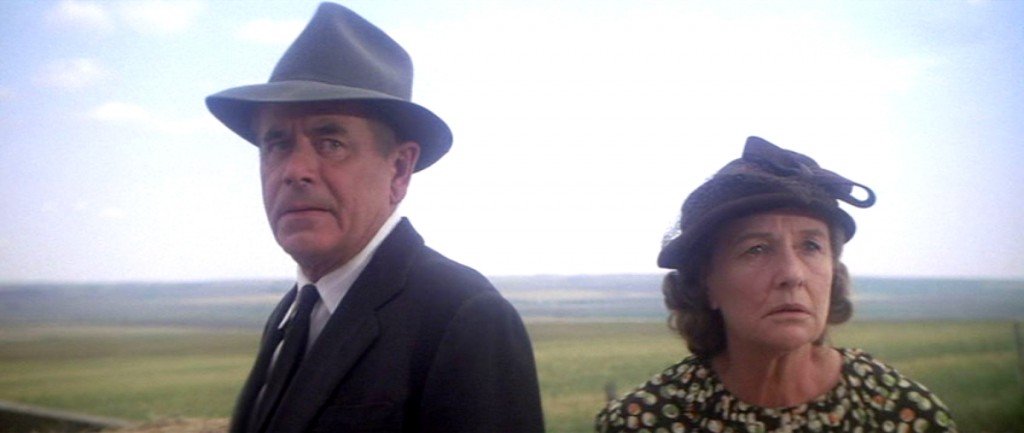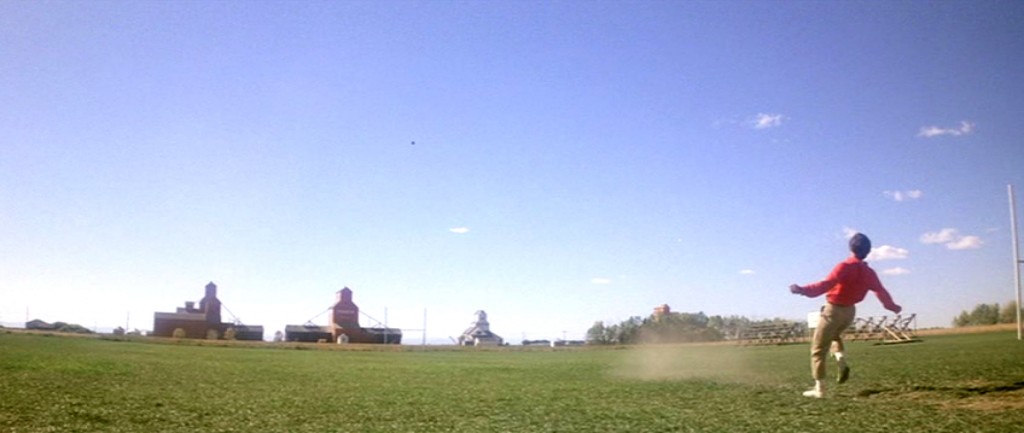Superman: Superman: The Movie part 2
So Jor-El sends his son Kal-El to Earth because his planet, Krypton, is destroyed. Yesterday I was talking about how Krypton doesn’t seem to be that great a place, and it occurs to me that, if Superman is an immigrant allegory and a krypto-Jew, then Krypton is Poland and Jor-El’s clan are Jews among Poles: outcasts even among their own people. Or, rather, they are what David Mamet calls “our Jews,” part of the Kryptonian establishment but not really considered true Kryptonians and mistrusted when the going gets rough.
In any case, Jor-El sends his son away from the icy sterility of Krypton and into Kansas, the breadbasket of America and the place Dorothy was so sick of. So the people who find Kal-El’s set-adrift basket in the rushes are not high-level Egyptians in the capital of the state, but precisely no one from nowhere, Ma and Pa Kent from Smallville, “the people” mentioned at the top of the US constitution and the least Jewish people in America’s least-Jewish state.
At the end of Tarantino’s superlative Kill Bill, we finally meet the titular Bill, and the first thing he does is regale us with his opinion of Superman. Superman, he says, is the only superhero who puts on a disguise when he’s not saving the world. Superman is his real identity, says Bill, Clark Kent is his opinion of what an Earth-man is: clumsy, oafish, meek, skittish, terrified of girls. Tarantino is one of our greatest living directors, but in this he is dead wrong: Superman is Clark Kent, and that’s his defining characteristic. Born a god, he is raised as a human, a Kansan no less, which makes him more human than most people. The answer to “Why doesn’t Superman just take over the world?” is: because his parents raised him to be polite. The brilliant graphic novel Red Son asks “What if Superman had landed in the Soviet Union instead of Kansas?” because yes, Superman may be from Krypton, but he is not a Kryptonian, he is a nice young man from Smallville. Yes, his homeland was destroyed, but his homeland wasn’t even a homeland to his own family – Kansas is the only home he’s ever known.
So here is Clark, now a shy, awkward teenager in Kansas in the 1950s, picked on by bullies and an also-ran with the girls. What does Teen Clark want? “To show everyone.” A Jew raised by Protestants (and goyishe enough to pass), he’s been taught to hide his light under a bushel, in spite of his tremendous powers. Jor-El was okay with his son standing out among mere mortals (in his chandelier-craft, a recorded message from Jor-El admonishes Kal-El that he is forbidden to interfere with human history, as though the mere existance of him wouldn’t interfere with human history), but the Puritan-descended Jonathan Kent is more repressive: his mantra is “don’t show off.” He says that Clark is here for a reason. “I don’t know who’s reason,” he adds, but the implication is clear: Clark Kent is The One, and that designation carries with it the weight of the world. In this battle of Jor-El vs Jonathan, Clark’s own personality tends to be lost: he’s a blank slate, scribbled on by two fathers. Otherwise, why wouldn’t he move through life with a sense of great confidence? A boy doesn’t mind being picked on by a bully if he knows the bully is an idiot and a loser, the shame of being bullied extends from the fear that the bully might be right.
No sooner does Pa Kent remind Clark to cool off than he has a heart attack and dies, there in the driveway of his farm in the heart of America. Clark bemoans his inability to save him, sealing his fate as a mortal: to be human is to know that you must one day die. His Kryptonian father died saving his life, his Earth father died while cautioning him to be careful, and now he’s on his own (neither of his mothers have much say in the matter). Or not quite. A narrative convenience calls Clark out to his father’s barn, where he finds a glowing green crystal from his chandelier spacecraft. The green crystal tells him, somehow, that it’s time to leave his second home.
The Smallville scenes of Superman are shot with a real sense of reverence, Grant Wood couldn’t have captured the heartland with greater affection, Ed Hopper couldn’t have given it more sober grandeur. It raises the question, where were the farms of Krypton? They seemed to have only wasteland and machines on their ice-covered planet. Which is probably why, when Clark leaves Smallville, he seeks a place that reminds him of his first home: a barren wasteland of the arctic (presumably the Canadian arctic, it would hardly do for Clark to build a hideaway in the Soviet arctic). There, his first father, in the shape of his green crystal (a Kryptonite crystal?) builds him his own home, or, rather, a kind of Kryptonian tree-house. So the struggle of Pa Kent vs Jor-El continues over the question of who Superman is really. Jor-El, now an interactive hologram, takes Clark to school. In a drama-free scene involving the camera moving through outer space with bad special-effects whizzing by, Jor-El lists facts and pontificates on this and that. He, again, tells his son not to interfere in human history, but rather to lead by example, because humanity are “good people, they lack only the light to show the way,” which strikes me as a pretty arrogant thing for a Kryptonian to say – we didn’t meet any good people, or enlightened people, on Krypton. Jor-El, like many fathers, seems to be still trying to fight his own battles through the raising of his son.


According to some interpretations, Batman is real and Bruce Wayne is the fake. His mask, then, does not conceal, but reveal.
Soo Bill was wrong in more ways than one.
Bill of ‘Kill Bill’s monologue about Superman comes, roughly word-for-word, from an essay in Jules Feiffer’s 1965 book ‘The Great Comic Book Heroes.’
Jor-El’s collection of Cliff Claven Little Known Facts (“…of the 27 known galaxies…”) monologued while Kid Clark is in his chandelier (and later, at the Fortress of Solitude), reminds me of the Venture Bros. Learning Beds!
In more ways than one: Despite his great wisdom, Jor-El’s belief that all this jibber-jabber is really important is tempered by Clark being on Earth, and in America now.
Sort of “Clarke, your alien dead father went on and on about a lot of things. Take it with a grain of Earth salt…”
I also noticed that Jor-El makes Clark sit through school twice, once as an infant and again as an adolescent.
Todd, have you read Tom DeHaven’s “It’s Superman!”? That book has a pretty original, and maybe too subtle, take on who the glasses-wearing Clark Kent is. I don’t want to give it away, but the book actually ENDS with Clark / Superman inventing the familiar Clark Kent persona….a decision that grows naturally out of the preceding story.
Haven’t read it. It sounds interesting.